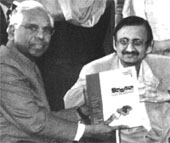A vital book...
 " this is a vital book. It will have far-reaching influence on Indian and global thinking. I am privileged in receiving it. I congratulate the Centre for Science and Environment (cse) and its director Anil Agarwal for bringing out this book and for sensitising the Indian government and the public about environmental problems and challenges," said K R Narayanan, President of India, at a function organised in the Rashtrapati Bhavan on March 1, where he was presented Green Politics , cse 's first report on global environmental negotiations (see p32: Small world ). The book is written by Anil Agarwal, Sunita Narain and Anju Sharma. The president commended cse for highlighting crucial environmental issues without necessarily taking a negative stance towards developmental projects. He presented Agarwal a statuette of the Buddha.
" this is a vital book. It will have far-reaching influence on Indian and global thinking. I am privileged in receiving it. I congratulate the Centre for Science and Environment (cse) and its director Anil Agarwal for bringing out this book and for sensitising the Indian government and the public about environmental problems and challenges," said K R Narayanan, President of India, at a function organised in the Rashtrapati Bhavan on March 1, where he was presented Green Politics , cse 's first report on global environmental negotiations (see p32: Small world ). The book is written by Anil Agarwal, Sunita Narain and Anju Sharma. The president commended cse for highlighting crucial environmental issues without necessarily taking a negative stance towards developmental projects. He presented Agarwal a statuette of the Buddha.
While presenting the book, Agarwal expressed his gratitude towards the president for the guidance and encouragement that he had extended to cse over the years: "This is not the first time that he is flagging off a cse campaign. In his capacity as the vice-president, he had inaugurated our campaign against air pollution in 1996. Two years later, when he had taken over the office of the president, he blessed our campaign for rainwater harvesting."
"Due to globalisation, world production and consumption has reached a point when what we do in one part of the world affects other parts," said Agarwal, making a presentation that highlighted the key aspects of the book. "Instead of taking on the long-term issue of social justice and equity, governments have reduced the negotiations on climate change to small-time quibbling for funds and technology," he noted. "What we see emerging in the name of global environmental negotiations is, in fact, an extremely lopsided governance of the world's resources, controlled and manipulated by Northern countries," he warned.
He told the gathering that us President Bill Clinton had 200 people and the state department working only on climate change in the pre-Kyoto stage, whereas India had one officer spending only a third of his time on similar issues. "No political leader has any interest to ensure that the emerging global market or the emerging global ecological policy is managed in the best interest of the maximum number of people and on the basis of the principles of 'good governance' - equality, justice and democracy," he observed, adding, "With negotiations taking place in far-off capitals and often far beyond the prying eyes of the national media, the civil society in developing countries has little or no knowledge of the politics of these talks and is in no position to intervene."
Related Content
- Ground water year book 2020-21: Odisha
- Rich food, smart city: how building reliable, inclusive, competitive, and healthy food systems is smart policy for urban Asia
- Ground water year Book of Odisha 2019-2020
- Sustainable Development Goals: their impacts on forests and people
- Reaping richer returns: public spending priorities for African agriculture productivity growth
- Ground water year book 2015-16: NCT Delhi
